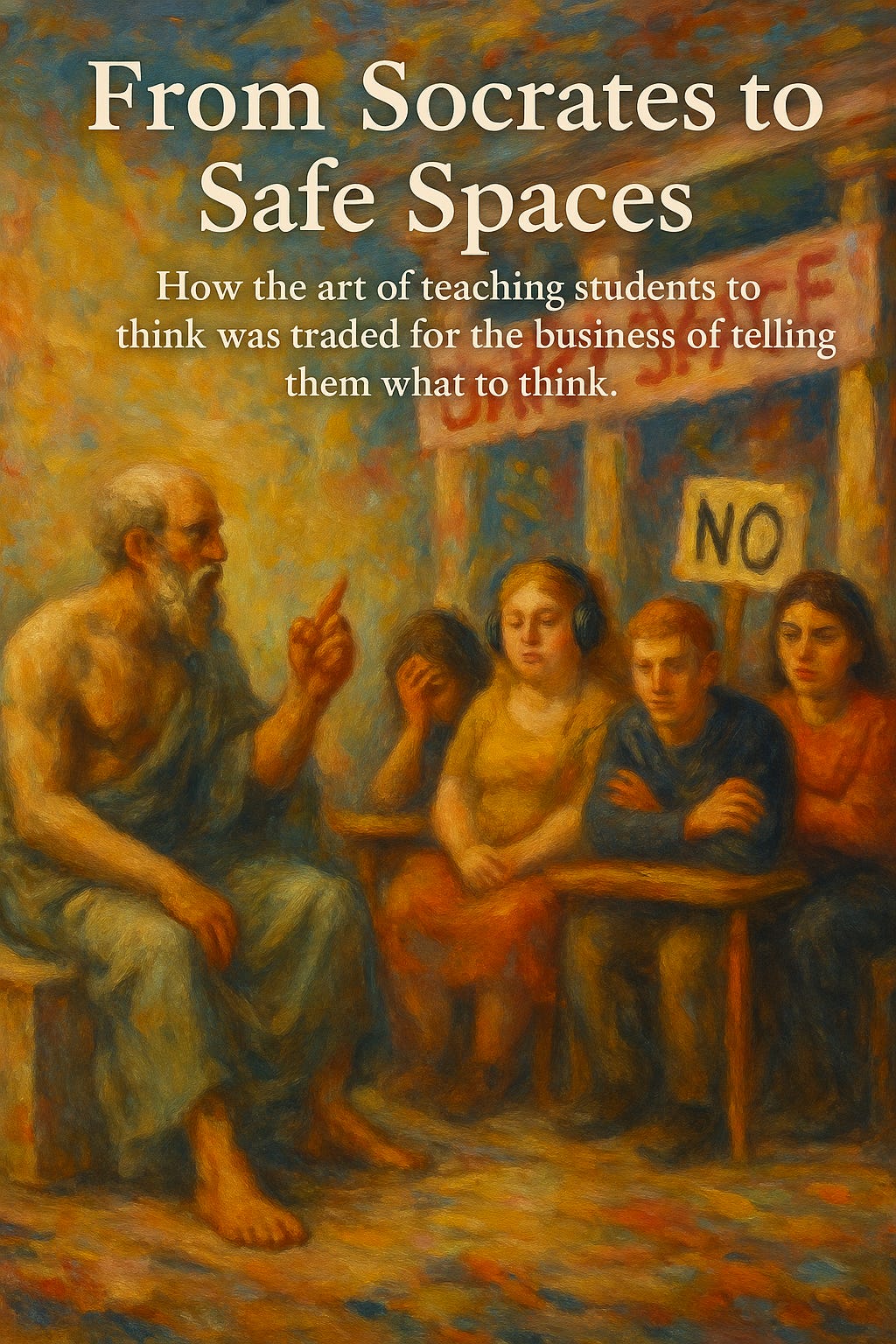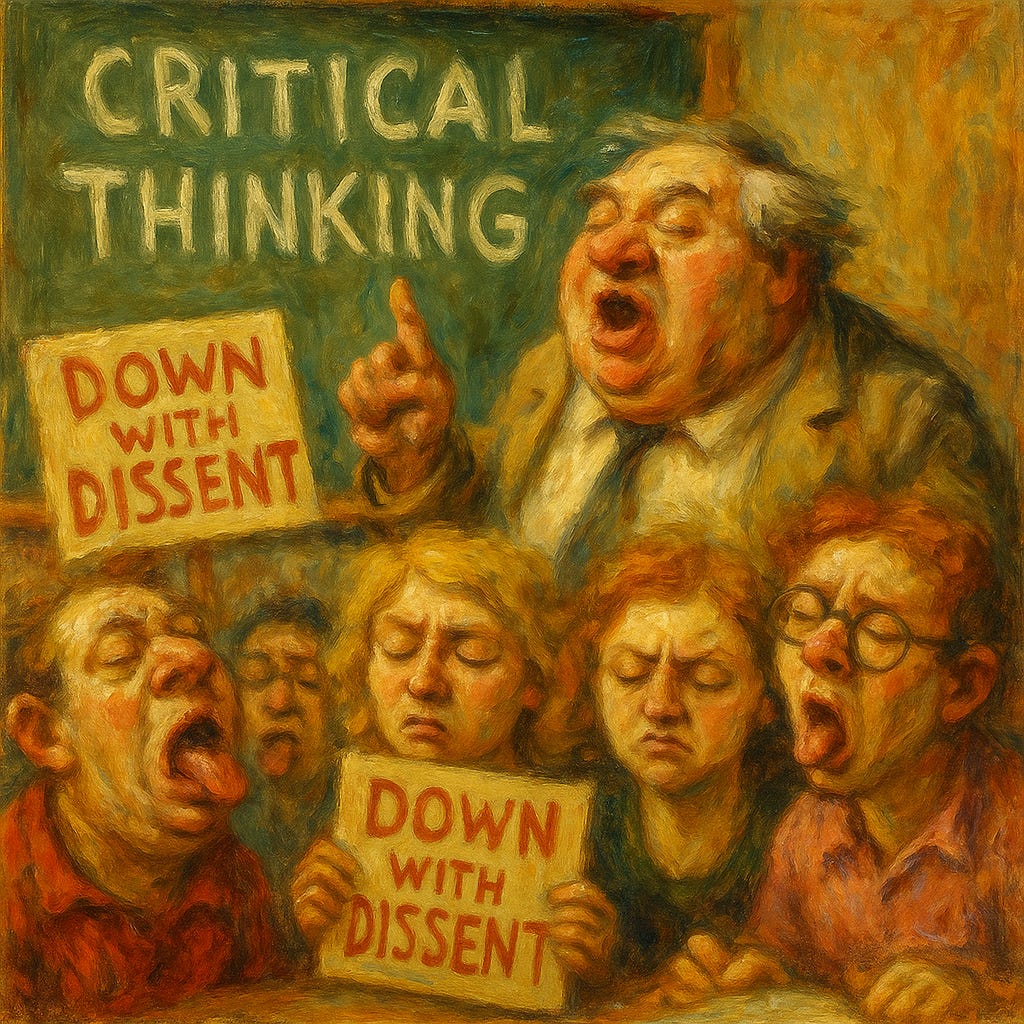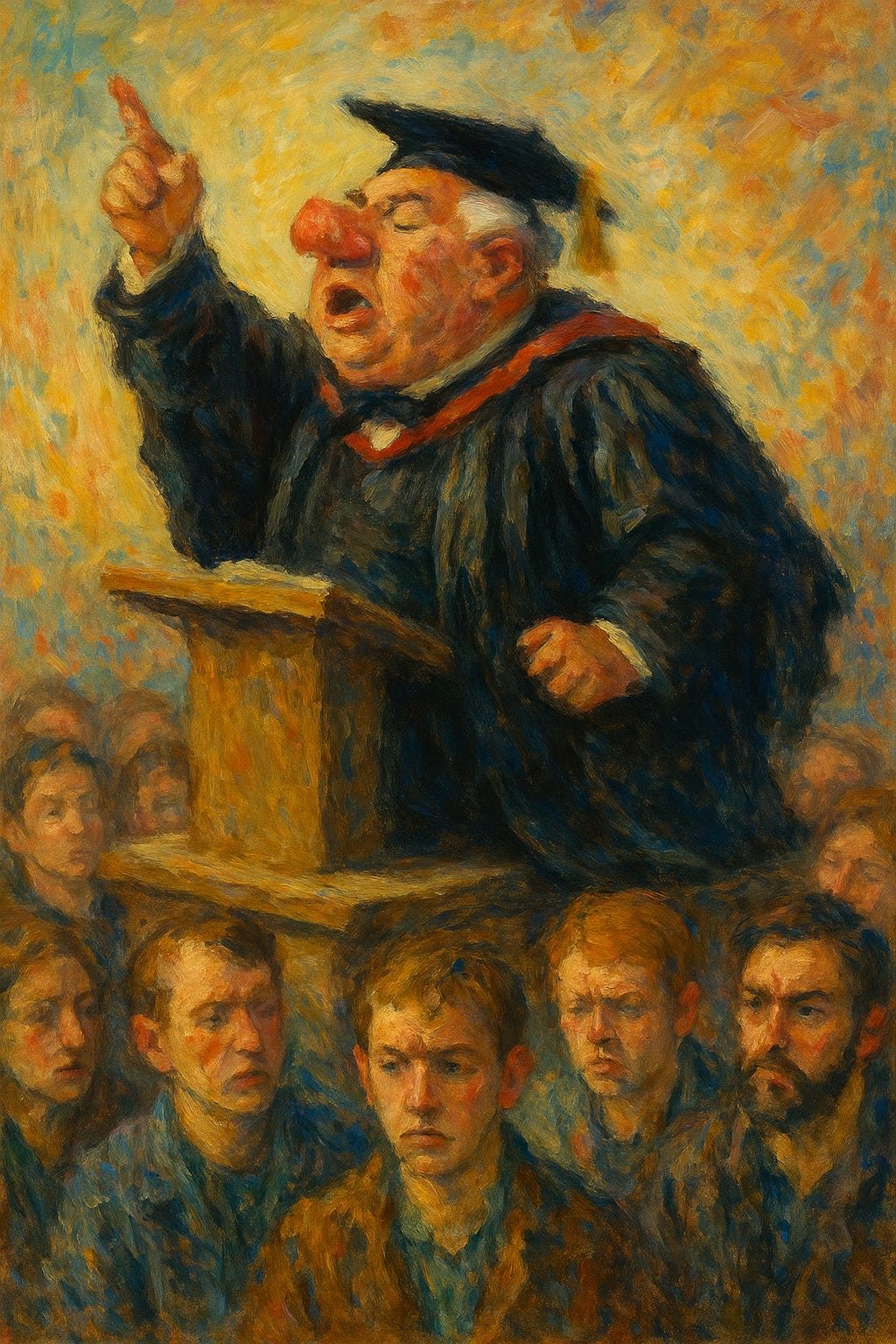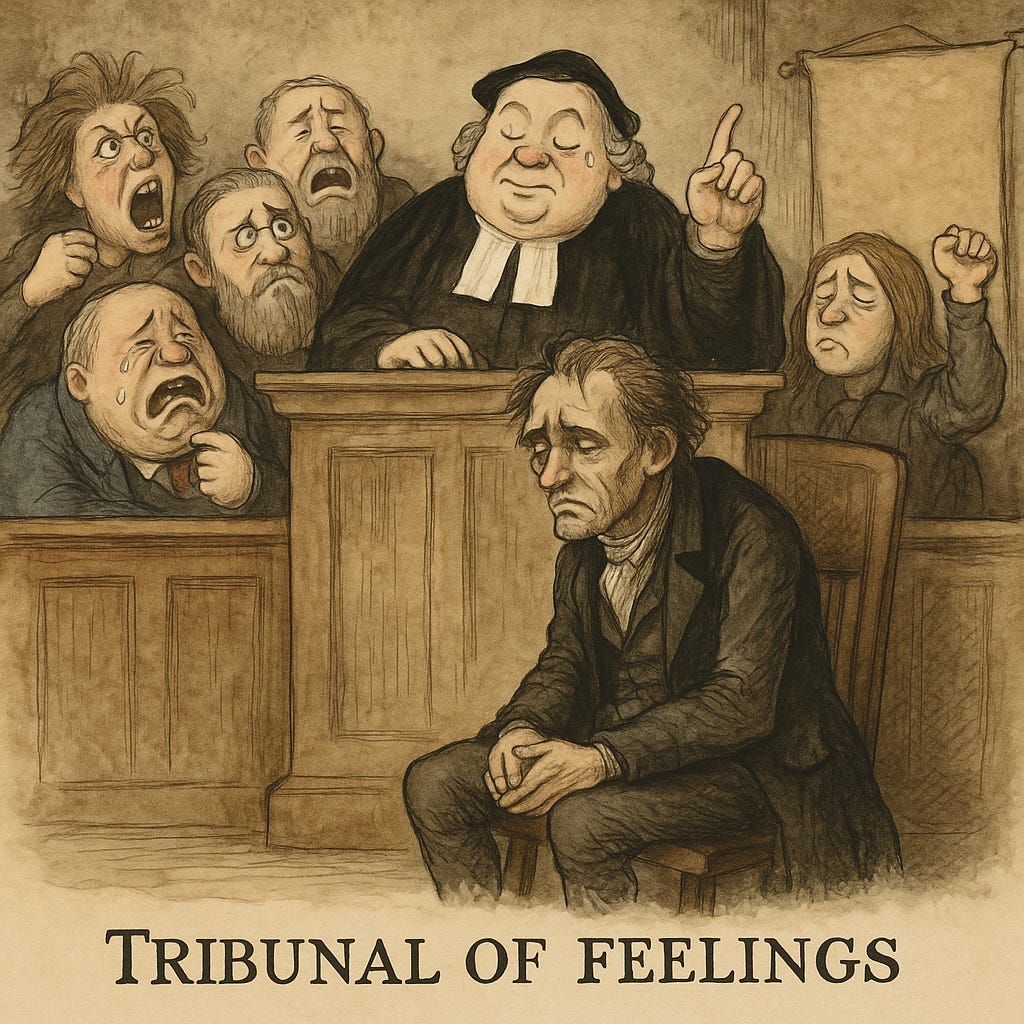The Indoctrination Drive-Thru
Order your degree at the window, hold the dissent, fries and outrage included.
“Education should aim at making people think, while indoctrination aims at making them stop thinking.”
Bertrand Russell
If you believe in the importance of free speech, subscribe to support uncensored, fearless writing—the more people who pay, the more time I can devote to this. Free speech matters. I am a university professor who was suspended and fired due to a free speech issue, so I am not speaking from the bleachers. The button below takes you to that story.
My daughter is in her first year of university and was recently asked to self-identify in a political assignment.
She was given three choices.
She doesn’t have a political bone in her body and took no offence at the blatantly propagandistic taxonomy. The “good” group was the socialists, redistributionists, and well-meaning communists whose century-long experiments left 100 million corpses behind. Oops.
The “bad” group, naturally, were the capitalists.
And the third sainted category: eco-druids, the tribe who never drove cars, never spilt oil on ducks, and never tried to scrub it off with the kind of no-name detergent that doesn’t quite work.
Yes, I invented the duck part—but only barely.
The entire exercise was catechism disguised as critical pedagogy. Its main lesson is that anyone who prospers has done so by theft, while conveniently omitting the fact that the top quintile of earners pays more than half of all gross income taxes.
The assignment was not teaching; it was propaganda with a veneer of office hours.
I have seen worse. But the poison does not only ooze from textbooks. It resides in grading rubrics that reward mimicry, instructors who confuse bias with truth, and faculty who believe their job is not to sharpen inquiry but to bless the faithful.
Consider Jasbir Puar’s The Right to Maim, a Princeton set text, which accuses Israelis of mining Palestinian body parts—a grisly recycling of medieval blood libels. Consider Samera Esmeir, who insists Gaza is Israel’s “laboratory,” an experimental slaughterhouse to test new forms of cruelty. Such claims are not instruction; they are liturgy.
Hiring committees only entrench the disease. According to Inside Higher Ed, fewer than 4 per cent of humanities professors identify as conservative. A monoculture of ideology polices its own boundaries. The rot is self-perpetuating.
Thus, the Socratic gadfly is evicted from the classroom. In his place comes not inquiry but incantation: the soapbox, the sermon, the pulpit with PowerPoint. The syllabus is traded for scripture, the lecture hall for the revival tent.
What follows is not education but manufacture. We produce assembly lines of students who can chant slogans in perfect rhythm but cannot construct arguments if their lives depended on it.
They can riot outside Concordia shouting “Death to Israel,” but cannot, if pressed, find Palestine on a map. They demand the removal of statues but are at a loss to explain the ideas of the men they topple. They inherit the slogans of zealotry but none of its intellectual burdens.
John Dewey warned that indoctrination occurs when classrooms become rallies. The Toronto District School Board recently did him one better: they skipped the metaphor and quite literally turned a field trip into an anti-Israel demonstration. Why simulate indoctrination when you can simply deliver it wholesale?
Nor is this malaise confined to secondary schools. Consider Evergreen State College, where a biology professor once questioned whether banishing white students for a “Day of Absence” was really the path to racial reconciliation. Instead of dialogue, there was denunciation. Instead of an argument, there was a mob. The students had the perfect opportunity to practise critical thinking, but chose instead to rehearse intimidation.
And then, closer to home, there is my own case. Terminated after twenty months of suspension, I was guilty of the mortal sin of calling a Hamasophile in Pakistan—a man openly demanding Israel’s destruction—a Nazi enthusiast. This, I was told, offended “all Muslims.” No matter that the complaint came courtesy of a professor friend of the Vice Provost. No matter that the Vice Provost herself later filed a human rights complaint to cloak the vendetta in the tatters of due process. The verdict was preordained.
I should have anticipated as much. At Canadian universities, Jews are not permitted to be offended—not even when publicly called filth, subhuman, Satanists, Nazis, or body-part merchants by their academic colleagues. No, Jews are to take it on the chin, smile, and be grateful that they are still allowed on campus at all. My radical accusers, if given their way, would be delighted to revoke even that meagre concession.
And their way, let us be clear, is advancing.
Indoctrination is not merely ignorance; it is ignorance in ceremonial robes, ignorance with a certificate. It is stupidity, credentialed and credentialled, paraded as enlightenment.
Orwell diagnosed the ailment with X-ray clarity. In 1984, doublethink is indoctrination perfected. In "Politics and the English Language," he observed how words are weaponised until they no longer convey thought but strangle it. How many classroom conversations now begin and end with “settler-colonialism” or “white supremacy,” the incantations of our new priesthood?
Animal Farm gave us its epitaph: all animals are equal, but some are more equal than others. Orwell was a socialist himself, but one allergic to cant.
Bertrand Russell, another man of the left, loathed indoctrination with equal ferocity. Education, he argued, should cultivate doubt, not obedience. “Passive acceptance of authority is the chief cause of intellectual and moral stagnation,” he warned.
Paulo Freire, in Pedagogy of the Oppressed, diagnosed the “banking model” of education—teachers depositing doctrine into passive students. He advocated dialogue instead. At the University of Guelph and Guelph-Humber, I fought the literal banking model: faculty using publishers’ test banks for exams. Students, who invariably had the answer keys, learned only cynicism. The ritual was memorisation, regurgitation, and flushing away the moment the exam ended. Management was outraged at my impertinence to suggest that someone teaching a course should know enough about the subject matter to write their own exams.
When I raised this malpractice, I was told to shut up. Test banks and teaching assistants enable courses to be taught with minimal effort. Students, meanwhile, are hooked on grade inflation, the academic equivalent of crack cocaine.
And so cynicism becomes the only genuine lesson.
Assignments follow the same script. Corporate social responsibility is assumed to be good, while dissent is assumed to be evil. Industrial policy is taken as gospel. Literature courses are hijacked into catechisms: Gatsby condemned for patriarchal wealth, Lear for cisgender bias, Macbeth for toxic masculinity.
Frederick Douglass said it is easier to build strong children than to repair broken men. Socrates spent his life provoking the complacent and was killed for it. John Stuart Mill insisted that even wrong ideas have value because they serve to sharpen the truth. Russell warned against passive acceptance. Orwell tore the mask off propaganda.
And what do we do? We hand students slogans instead of sentences. We feed them dogma instead of doubt. We produce, in place of thinkers, credentialed parrots. McNuggets University: filling, profitable, and intellectually void. Indoctrination is the fast food of the mind.
If we fail at that, we will get the students we deserve: credentialed, illiterate mobs, chanting their way toward tyranny, mistaking indoctrination for education and servitude for thought.
Consider the students who leave university unable to articulate a coherent argument without resorting to slogans. They can decry colonialism at the drop of a hat but struggle to explain what came before it or what might replace it. These graduates don’t enter the world equipped to engage with its complexities; they enter armed with dogma and anger, ready to shout down anyone who dares to disagree.
I see them rioting outside Concordia this morning, chanting Death to Israel.
Intellectual homogeneity stifles progress on a societal level. Innovation thrives on diversity—not just diversity of skin colour or gender but also diversity of thought.
If every classroom becomes an ideological assembly line, we risk creating a generation of intellectual clones or non-inquisitive idiots. Many politicians love such assembly lines; I dare say politicians on both sides of the political spectrum fantasise about becoming autocrats.
As George Orwell warned in 1984, “If liberty means anything at all, it means the right to tell people what they do not want to hear.”
Hence, the name of my Substack is "Freedom to Offend.”
I was proud of myself for not using any profanities in the title.
The most effective educators have consistently championed the importance of critical thinking.
Socrates, the original gadfly, spent his life challenging the status quo. He didn’t spoon-feed his students’ answers; he asked questions—relentlessly, annoyingly, brilliantly. His method wasn’t about indoctrinating; it was about illuminating. He pissed off the authorities so much that they put him to death.
In North America, we don’t do that yet (in Iran, they do), but don’t be fooled by censorship bills with human rights legislation that preaches guilty until bankrupt or innocent, the long, slow march to putting people to death or in jail for non-orthodox ideas is still out there and becoming larger and larger.
Enlightenment genius John Stuart Mill (will they topple his statues also? I’m sure he wasn’t gender positive and didn’t believe that ‘I identify as’ was the Aladdin-like phrase for asserting gender) strongly advocated for the marketplace of ideas.
In On Liberty, Mill argued that even wrong ideas have value because they force us to sharpen our understanding of the truth.
What would Mill make of today’s “safe spaces,” where dissenting opinions are banished in the name of emotional comfort?
So, what’s to be done? How do we wrest education from the jaws of indoctrination? To begin with, we need to demand accountability. Universities must commit to intellectual diversity—not just as a buzzword but as a guiding principle.
Those peace studies degrees that indoctrinate students into a career as a barista? Student loans should be tied to job placement success. If a university starts up some fluff master’s degree that the market deems to have no value, the student loan should be reset at the true value of the degree. We might see some loans fall to double figures.
Professors should be evaluated on their ability to foster open, inclusive dialogue in the classroom.
Students, too, must play their part. They must resist the temptation to parrot their professors’ beliefs for an easy grade. They must challenge, question, and push back.
Education is fragile. It requires care, balance, and a relentless commitment to truth. Indoctrination, by contrast, is easy. It’s the intellectual equivalent of fast food—cheap, satisfying, and ultimately unhealthy.
However, the problem with McNuggets University is that it is fulfilling, profitable, and easy.
If we allow our universities to become indoctrination camps, we risk not only the futures of our students but also the future of our society.
The educator’s job is not to create disciples; the administrator’s role is not to make the gears turn. The student’s job is to question and refuse to allow themselves to turn their education into McNuggets University, no matter how lazy, fat, and disengaged the adults in the room are.
The job of all three is to create thinkers. And that means teaching them how to fish—not handing them a dead trout, praising their fishing ability and pushing them into a wilderness where they will soon be hungry.
If you found value in this article and wish to support my ongoing work, please consider leaving a tip. Your support helps me continue producing uncensored content on critical issues. I was a professor for 15 years, until I was canned mid-July 2025 for insulting a designated terrorist group that strangles 10-month-old infants in their coffins.









